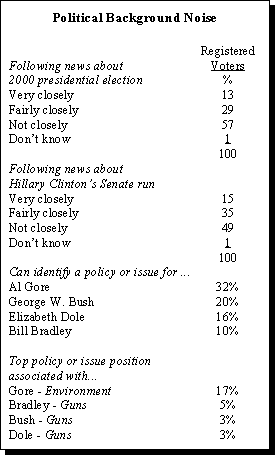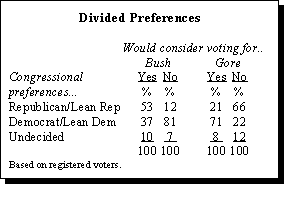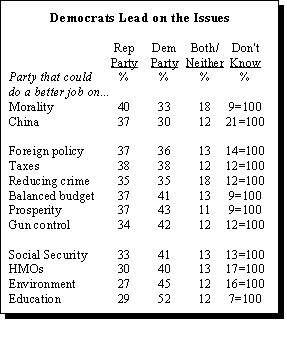Introduction and Summary
The early presidential primary season may have front-loaded candidate announcements, political advertising and the media roadshow, but it’s all background noise to the average American voter. Nearly two-thirds of the public is paying little or no attention to the 2000 election, and knowledge of the presidential candidates and opinions about them are little changed since February.
 Texas Governor George W. Bush and former Red Cross President Elizabeth Dole continue to stand out from the Republican pack because nearly all voters have heard of them and at least half say they will consider voting for each. But despite this frontrunner status and resulting press attention, only one-in-five identify either candidate with any issue or policy position.
Texas Governor George W. Bush and former Red Cross President Elizabeth Dole continue to stand out from the Republican pack because nearly all voters have heard of them and at least half say they will consider voting for each. But despite this frontrunner status and resulting press attention, only one-in-five identify either candidate with any issue or policy position.
Beltway boomlets for Democratic challenger and former New Jersey Senator Bill Bradley and GOP Senator John McCain also failed to attract the attention of voters, many of whom have not even heard of them. While McCain is slightly better known than he was in February, neither he nor Bradley show any increase in support since May.
Al Gore, meanwhile, faces different challenges. One-third of voters can identify the vice president with policy issues, and there has been a slight increase since May in the number who say they will consider voting for Gore. But it is still barely half, and the share of Americans who say they want the next president to continue the policies and programs of the Clinton administration tumbled 11 percentage points to just 43% over the past four months.
If Americans seem to be leaning toward the Republican candidates for president, however, they are also tilting toward the Democrats on issues broadly and for Congress specifically. Half of registered voters now say they plan to vote Democratic for Congress.
Moreover, on 12 issues tested, ranging from education to foreign policy and Social Security, Americans say Democrats would do a better job than Republicans on six issues, and the two parties come out even on four. Republicans are favored only on their ability to deal with China and promoting moral responsibility.
At the same time, Americans do not see any single issue as an overwhelming problem facing the country today. Unlike years past, when large numbers cited jobs or crime, no issue is listed today by more than one-in-five Americans. Even the broad category of economic concerns — near the top of the list for years — is mentioned by only 8% of the public, down from 16% just a year ago and 58% six years ago. Concern about foreign affairs stands at just 11% — even after nearly three months of NATO airstrikes in Kosovo.
Instead, Americans say the top problems facing the country are crime, morality, teen violence, guns, and education. And all have a common thread — the shooting deaths at Columbine High School in Colorado. In that connection, 55% of the public holds unfavorable views of video game manufacturers, more than the 45% who feel this way about the National Rifle Association and the 38% who are critical of Hollywood.
Even interest in Hillary Clinton’s likely Senate campaign is scant. Fewer than one-in-five are paying very close attention to her campaign. Only a plurality says they hope to see her run.
These are the principal findings of a June 9-13, 1999, Pew Research Center poll of 1,153 adults. A more detailed analysis follows.
Boost for Bush, But Not GOP
The public preference for GOP presidential candidates does not automatically translate into good news for the Republican Party as a whole, which continues to show signs of weakness in other areas. The Democratic Party is seen as stronger than the GOP across a number of issues, and the Democrats continue to hold a slight lead in a generic ballot looking ahead to the next congressional elections.
The Republican leadership in Congress continues to get poor grades, with 37% of Americans approving and 46% disapproving of their performance. And with the 2000 congressional elections still more than a year away, voters give Democrats an edge over the Republicans. Today, 50% of voters say they would vote for a Democrat, while 40% say they would support a Republican for Congress.
 What’s more, Republican congressional chances are not boosted by the early support for George W. Bush’s candidacy. More than one-third (37%) of voters who say they will consider casting a ballot for Bush for president are nonetheless inclined to vote for a Democratic candidate for Congress in 2000.
What’s more, Republican congressional chances are not boosted by the early support for George W. Bush’s candidacy. More than one-third (37%) of voters who say they will consider casting a ballot for Bush for president are nonetheless inclined to vote for a Democratic candidate for Congress in 2000.
Equally important, Americans see the Republican Party as better than the Democrats in only two of 12 issues asked about in the poll — morality and dealing with China. Some 40% of Americans say the GOP is the best party for promoting morality and personal responsibility, while 33% say the Democrats are better suited for the job. Similarly, 37% favor the Republicans when it comes to dealing with China, while just 30% say the Democrats would be better.
But Republicans have lost ground on several other key issues. Notably, the two parties are dead even on reducing crime — an issue that tops the public’s list of the most important problems facing the country. The parties are also even when it comes to making wise decisions about foreign policy, an area where the Republican Party enjoyed a nine percentage point advantage as recently as March 1998. The GOP does enjoy more of an edge on foreign policy among Americans who disapprove of the recent air strikes against Serbia, while the Democrats are viewed more favorably by those who approve of the air campaign.
 Meanwhile, the Democratic Party continues to be seen as stronger than the Republican Party in most issue areas, including education, the environment, and regulating HMOs and managed health care. Fully half of Americans (52%) say the Democrats could do a better job improving the educational system, for example, compared to just 29% who see the Republicans as better.
Meanwhile, the Democratic Party continues to be seen as stronger than the Republican Party in most issue areas, including education, the environment, and regulating HMOs and managed health care. Fully half of Americans (52%) say the Democrats could do a better job improving the educational system, for example, compared to just 29% who see the Republicans as better.
Although the Democrats also enjoy a slight edge over Republicans when it comes to “reflecting your views about gun control” (42% vs. 34%, respectively), the party images on this issue are closely linked to public attitudes about restricting gun ownership. Among the majority of Americans who say it is more important to control gun ownership, 55% say the Democratic party is better on this issue. But among those who say it is more important to protect the right of Americans to own guns, 56% favor the Republican Party.


